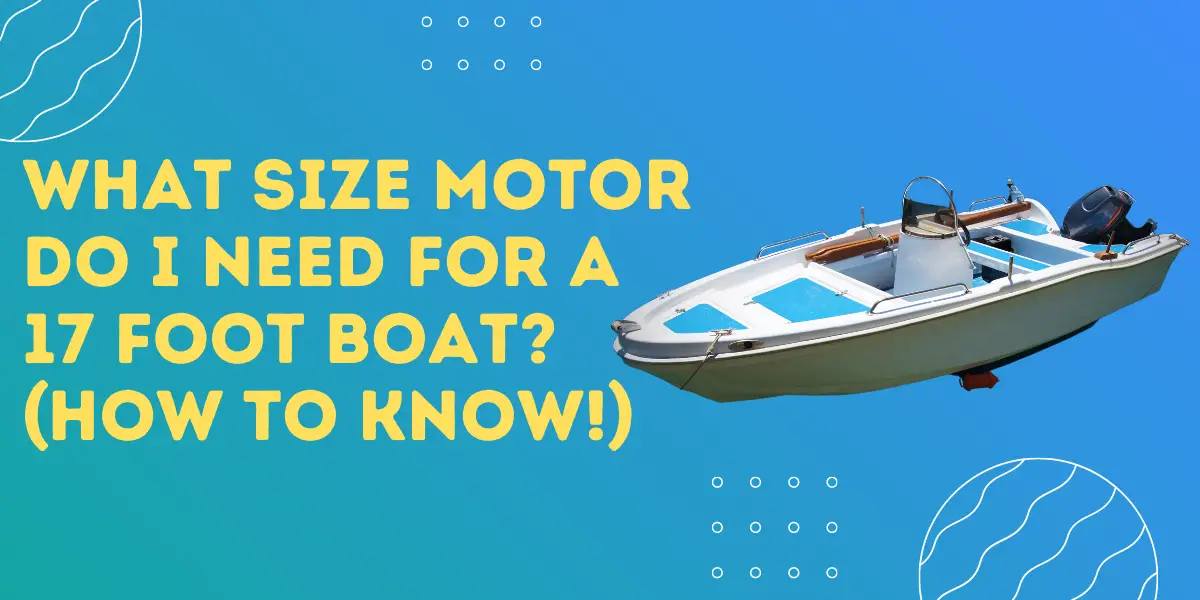In order to know what size motor you need for your 17 foot boat, it’s important to understand how much power is necessary to push the boat through the water and the variables that impact this (such as the size of the motor and the weight of the boat).
There are a lot of things that people do wrong when choosing a motor, but once you understand the different factors that come into play, it becomes much easier to make an informed decision.
In this article, we’ll talk about what size motor do I need for my 17 foot boat?
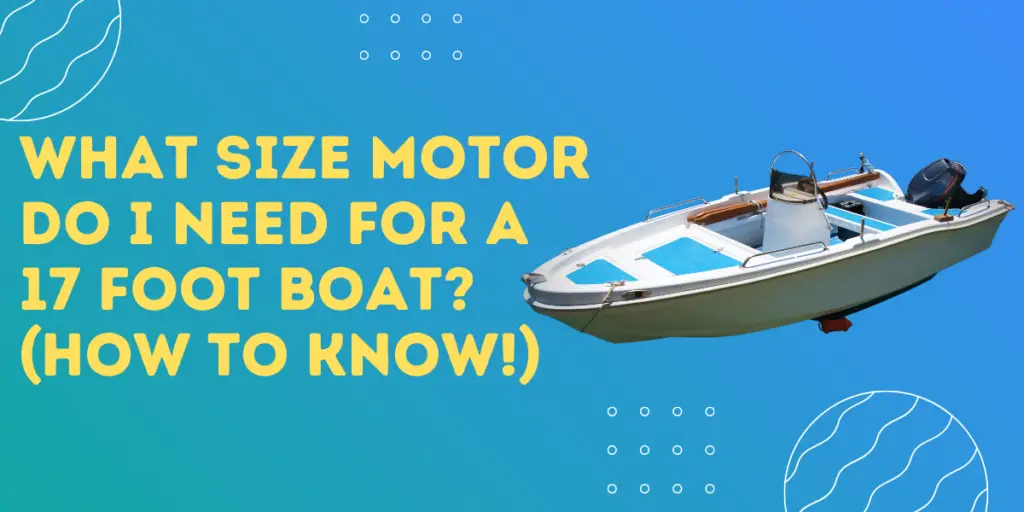
Here’s What Size Motor Do I Need For A 17 Foot Boat:
Typically, you need at least a 20 horsepower outboard motor for a 17-foot boat. However, some boats have smaller motors, such as the 7 to 12 hp range.
Many new boat owners face this same problem. It is challenging, if not impossible, to know which engine is the best one. Most motor manufacturers can recommend the correct engine for a boat. For some engines, this may not be the one you want.
What Size Motor Is Best For a 17 Foot Boat?
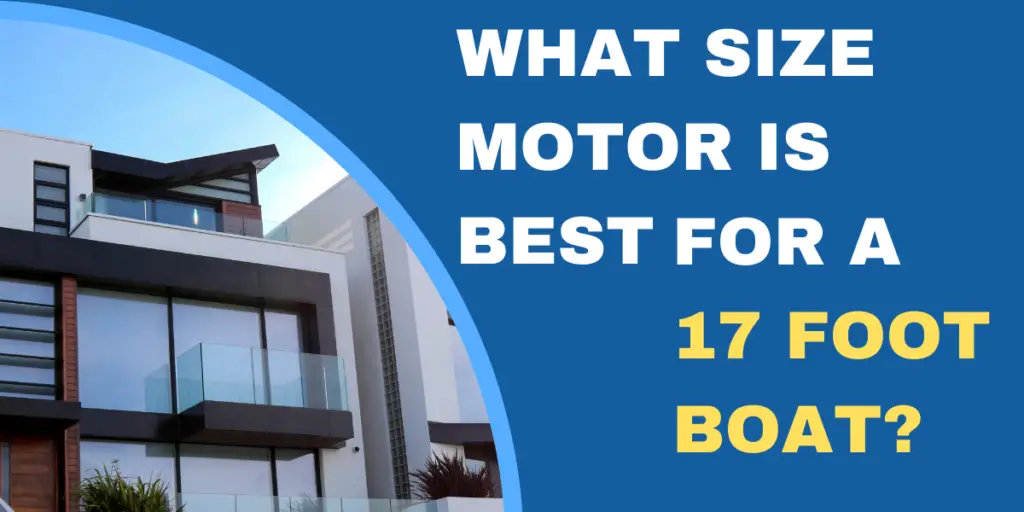
The topic of what size motor is optimal for a 17-foot boat has no simple answer. The size of the motor you require is determined by a variety of factors, including the hull of your boat, how you plan to use the boat, and your budget.
When picking a motor for a 17-foot boat, there are a few things to keep in mind:
- The hull of your boat will affect how much power you need. A heavier boat will require a more powerful motor.
- How you plan to use your boat will also affect the size of the motor you need. If you intend to use your boat for cruising rather than racing, you will need a different size motor.
- Your budget is another important factor to consider when choosing a motor for your boat. More powerful motors will be more expensive.
When it comes to calculating the appropriate motor size, which is optimal for a 17-foot boat, there is no one-size-fits-all solution. The motor size you require is determined by the following factors on your specific boat and how you plan to use it. Talk to a professional to find the right size motor for your boat.
Considerations When Choosing The Right Motor
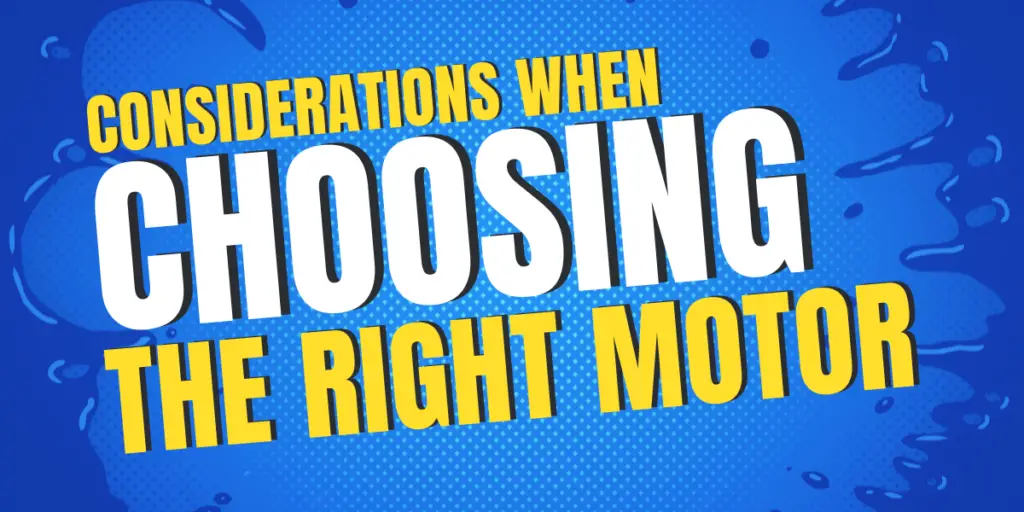
There are a few crucial considerations to make when choosing a motor for your boat. The most important factor is how much weight your boat will be able to carry and how much fuel it will need.
A lot of variables, such as throttle, shaft size, and cruising rpm, impact these two factors, so there isn’t an easy answer. To choose the right motor, you first need to know what kind of boat you have.
The size of the motor will also depend on the type of boat.
- A pontoon boat will need a different size motor than a fishing boat.
- When choosing the right motor for your 17 foot boat, there are a few things to consider.
- The first thing to consider is the weight of your boat. The heavier your boat is, the more power you will need from your motor.
- The second thing to consider is the type of water you will be using your boat in. If you are using your boat in calm waters, you won’t need as much power as you would if you were using your boat in rough waters.
- The third thing to consider is how fast you want to go. If you are just using your boat for leisurely activities, you won’t use nearly as much power as you would if you were racing your boat.
Once you have considered all of these factors, you can then decide on the size of motor you need for your 17 foot boat.
How Much Does a Motor Cost?
This is a difficult question to answer because there are many factors to consider. The size of the motor, the type of motor, the brand, and the features all play a role in the cost of the motor.
The size of the motor is one of the most important factors to consider when determining the cost. A bigger motor will typically cost more than a smaller motor. The type of motor is also important. A four-stroke motor will typically cost more than a two-stroke motor. The brand of the motor is also a factor. Some brands are more expensive than others.
The features of the motor also play a role in the cost. A motor with an electric start will typically cost more than a motor without an electric start. A motor with higher horsepower will also typically cost more than a motor with lower horsepower.
Ultimately, the cost of the motor will depend on the specific motor you are looking at. You can’t get an all-encompassing response to this topic.
How Big of A Motor Can You Put on A 17 Ft Boat?
The size of the motor will be determined by the size and weight of the boat. The max horsepower for a 17 foot boat is 300 hp. You want to make sure that the motor is not too big for the boat. If it is too big, it can be bad for the boat and can cause damage.
Most 17 foot boats can hold up to a 115 hp motor. The size of the motor also depends on the type of boat. A fiberglass boat will be able to hold a bigger motor than an aluminum boat.
A small boat will need a different size motor than a much larger boat. In addition, make certain that the motor has adequate power to run the boat for an extended period of time. The motor should have enough torque to run the boat at top speed for a long period of time.
A 70 hp motor should be enough for most 17 foot boats. Make sure you obtain the right size motor for your boat. If you’re unsure, you can always talk to a professional. They will be able to help you find the right size motor for your boat.
What Determines Max Hp on A Boat?
There are a few factors, but the three primary ones are the hull’s safe carrying capacity, the amount of stress the hull can withstand, and the type of watercraft.
- The hull’s safe carrying capacity is the weight limit of the boat and everything it can safely carry. This includes the weight of the boat, the engine, the fuel, the passengers, and any cargo.
- The amount of stress the hull can withstand is determined by its design and the material it is made from.
- The type of watercraft also plays a role in determining the maximum hp.
Some of the factors affecting are:
- The size and weight of the boat
- The type of hull
- The type of engine
- The type of propeller
- The type of fuel
- The type of water
Common Mistakes When Determining The Motor Size
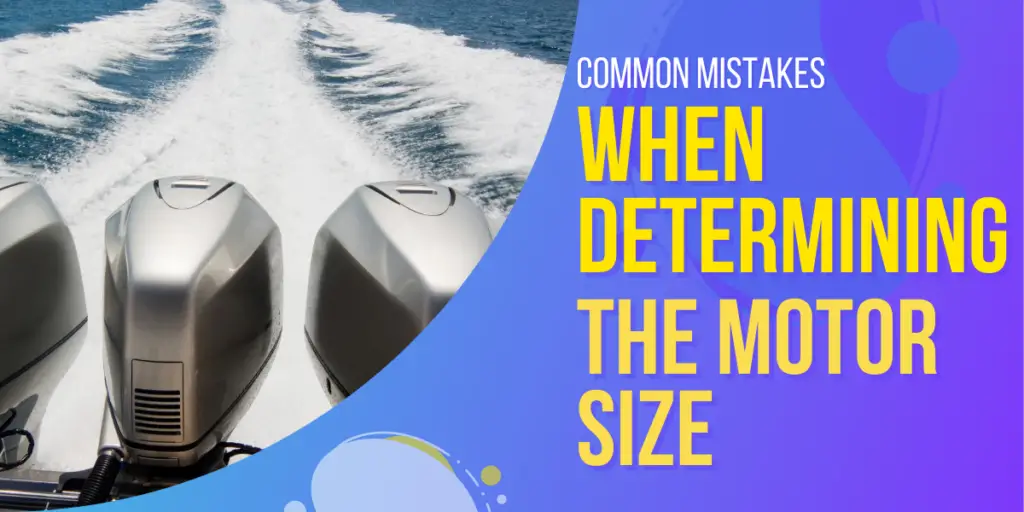
In order to determine how much power you need, there are several frequent blunders that individuals make.
One mistake is getting a motor that is too large. This can be expensive and may use more fuel than you need. It can also make your boat less versatile.
Another mistake is getting a motor that is underpowered. This can make it difficult to get your boat up to speed and can be dangerous in rough conditions.
The amount of power you need will depend on the size and capacity of your boat. The capacity plate on your boat will list the maximum weight and number of people your boat can safely carry.
You also need to consider the type of boat you have. Sterndrive boats need more power than boats with outboards. Outboards are more versatile and can be used on a wider variety of boats.
Finally, you need to consider how you will be using your boat. If you want to go fast, you will need more power than if you are just slow cruising.
Can I Put a Bigger Motor on My Boat than It’s Rated For?
Most boat manufacturers rate their boats with a certain size motor in mind. This is the size motor that the boat is designed to handle. Putting a bigger motor on a boat than it is rated for can be generally bad for a number of reasons.
- More horsepower than the boat is designed for can put undue stress on the hull and other parts of the boat, leading to damage.
- A bigger motor will usually have more cylinders than a smaller one and thus will consume more fuel. Running the boat at high speeds can put a strain on the engine, which can be expensive.
- A bigger motor can also damage the boat’s propeller and maybe even bend long shafts, leading to shaft damage.
- Finally, a bigger motor will usually mean less fuel economy, meaning you will have to fill up the tank more often.
So, what can you do to give your boat more oomph? Talk to a professional. They will be able to help you find the right size motor for your boat and advise you on the best way to get the power you want without damaging your boat.
Are Two Motors Better than One?
Most people think that having two motors on a boat is better than just having one. However, this is not always the case. Having two motors can actually be more expensive and require more space.
They are also heavier and use more fuel, which can increase fuel consumption. Additionally, two motors may not be able to go as fast as one motor due to drag, and they may not be able to travel as many miles.
Outboard vs. Inboard: Does Size Matter
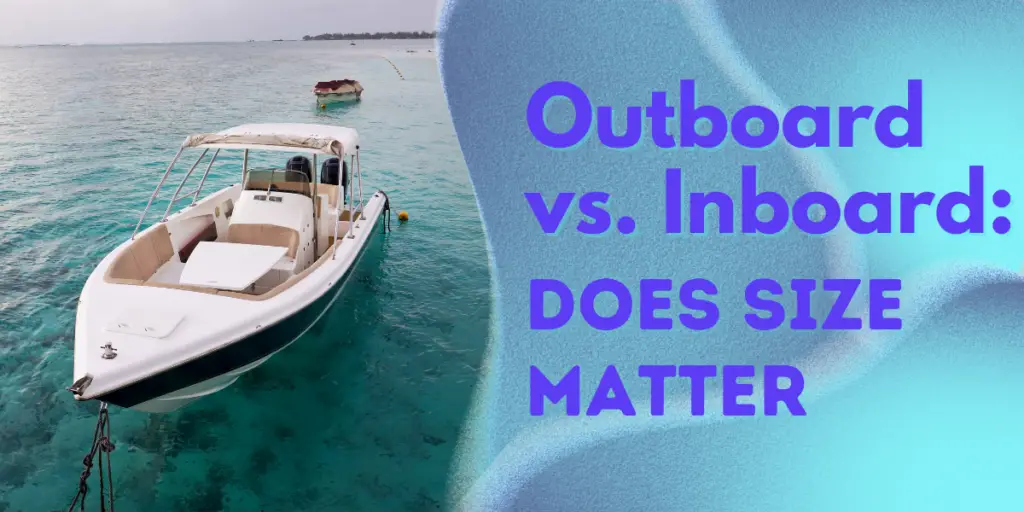
In most cases, the size of your boat will dictate the size of the motor you need. For example, a 17-foot boat will usually need an outboard motor with a shaft length of 20-25 inches.
Some exceptions to this rule exist. If you’re using your boat for fishing or other low-speed activities, you may be able to get away with a smaller motor. Longer journeys or high speeds may necessitate an even more powerful motor, however.
In general, outboard motors are more versatile than inboard motors. They’re perfect for small to medium-sized boats and can be used for a variety of activities. Plus, they’re relatively easy to install and maintain.
Inboard motors are best suited for larger boats. They’re usually less powerful than outboard motors and can provide a smoother ride. However, they’re also more expensive and require more maintenance.
Boat Horsepower-To-Weight Ratio
The size of the motor you’ll need for your 17-foot boat will depend on the weight of your boat and the desired speed. A good rule of thumb is to have 20 to 40 pounds of weight per 1 horsepower. This means that a 40 horsepower motor should be able to move a boat that weighs between 1,000 and 1,600 pounds.
Number of People Onboard Influence Size Of Motor
The number of people who will be on board your boat will have an influence on the size of motor you need. If you plan on having a lot of people on your boat, you will need a larger motor. If you only plan on having a few people on your boat, you can get away with a smaller motor.
Here are some things to keep in mind when deciding how many people will be on your boat:
- The more people you have on your boat, the longer your boat will be in the water. This means that you will need a larger motor to power your boat.
- More people you have, the louder your boat will be. This is because the engine will have to work harder to move the boat through the water.
- The more versatile your boat, the more people you can carry. This is because you will be able to switch to sails if need to be, to go faster and farther.
- The more people you have on your boat, the fewer miles per hour you will be able to go. This is because the boat needs more power to displace more water.
- The more people you have on your boat, the lower your speed will be. This is because the boat will be heavier and will not be able to move as fast through the water.
Does Insurance Cover Bigger Motor Then It Is Recommend?
No, insurance companies will not cover a bigger motor than what is recommended for a 17 foot boat. They may cover damages caused by the bigger motor, but not the motor itself.
- The size of the motor should be based on the size and weight of the boat.
- A 17 foot boat should have a motor that is no bigger than 30-40 horsepower.
- The weight of the boat should be considered when deciding on the size of the motor.
- A heavier boat will need a bigger motor to be able to move it.
In fact, if you were to put a bigger motor on your boat than what is recommended, your insurance company could drop you from their coverage.
Conclusion
In conclusion, the size of the motor you need for a 17 foot boat depends on a variety of factors. The biggest factor is the weight of the boat, as a heavier boat will need a bigger motor to move it. Other factors include the type of boat, how you plan to use the boat, and the water conditions you’ll be operating in.
The maximum horsepower for the boat, the octane of the fuel, the mph, and the boat capacity all play a role in deciding what size motor you need. Versatile motorboats are a good choice for a fishing trip or the long run because they offer a variety of features and can be used for different purposes.
So, to sum it up, the size of motor you need for a 17 foot boat depends on the weight of the boat, the type of boat, and the type of water you’ll be using it in. If you’re unsure of what size motor to get, it’s always best to consult with a professional.

